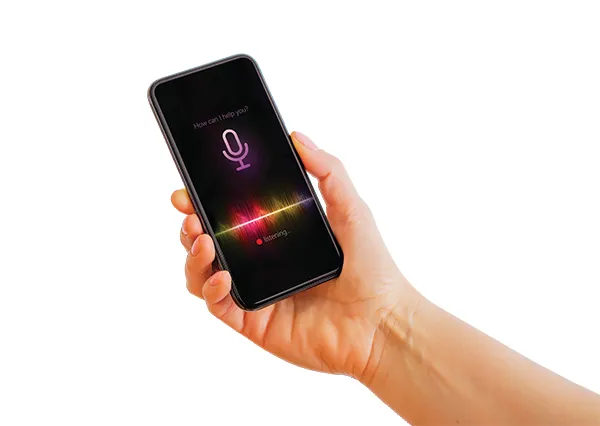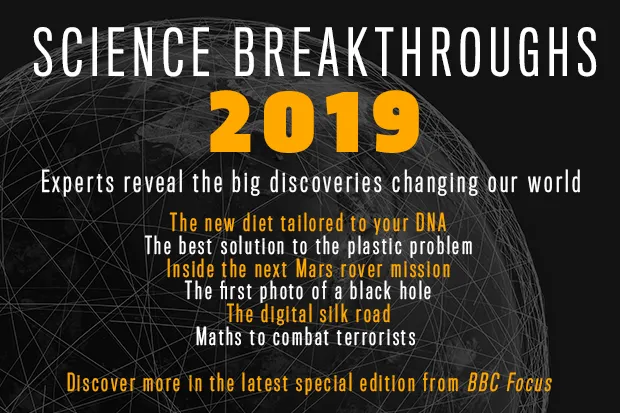How important is Artificial Intelligence going to be in the next few years?
Technology involving AI is rapidly evolving. We’ve not got there yet, but we’re moving very fast towards it.
But we already have things like Alexa…
When people talk about AI, they tend to mean something general. For example, SIRI and Alexa help answer questions, they sound as though they’re intelligent and figuring stuff out for you. Likewise, a complex computer programme can do things much more quickly than the human brain. For example, it can beat a grand master at chess, giving it the appearance of intelligence. But what it’s really doing is just running an algorithm, number crunching.
Read more 2019 science breakthroughs:
So what is true AI?
What we mean by true intelligence, nowadays, is if the machine uses something called machine-learning, whereby it’s not simply given a set of instructions by a programmer and follows them blindly, but learns as it goes, building its own code. That’s what modern AI machines are doing now. They use something called neural networks which are meant to mimic, in a sense, the way our brain works. A neural network is an abstract mathematical version of the human brain, and it is starting to show real intelligence by anyone’s definition.
How close are we to this?
Artificial intelligence machines are a long way behind what human brains can do. An AI can look at a picture of a dog and understand from the pixels what it represents, but it doesn’t know what a dog is. It doesn’t understand the concept of ‘dog’. And so, while it can do certain things faster and more efficiently, and even sometimes in more clever ways than humans, that’s still not intelligent in the way that we would talk about it. I think the problem is, we’re often too infected by Hollywood movies. And so, we think of AIs, or being intelligent, as somehow being conscious – being self-aware. That may come in the future, but we’re many decades away from that.

Is Artificial Intelligence really the right sort of phrase then?
Probably not, in hindsight. If we had to redefine it, we’d call it something else. Machine-learning, deep-learning or artificial neural-networks are maybe more accurate. They’re just not quite as catchy as artificial intelligence, AI.
What is true AI capable of now?
When an AI was tasked with the Chinese game of Go (which people regard as a better indicator of innovative ways of thinking than, say, Chess), it made a move that seemed silly at the time, but it was only much later on in the game that we appreciated what a genius move it was, because it became important as the game developed. So, it had discovered a solution to a problem that the people who built the machine didn’t understand and weren’t expecting. That’s real innovation going on inside these deep-learning machines.
That sounds incredible, but also a bit scary…
Yes. That is what a lot of people are concerned about. What if they start getting smarter and smarter, ever more quickly? What if they reach what we would refer to as the singularity – they develop ‘artificial general intelligence’, become self-aware and decide that they don’t need humans? This is the Skynet scenario from the Terminator movies. But people who work in AI are much more optimistic that we can maintain control and build in sufficient safeguards. Even though AIs may end up being more intelligent than us, they would still be in our control. I think we should be more nervous about the fact that AI is still very dumb, and potentially dumb but powerful people will control it, for reasons that are not so good. Technology itself is not good or evil. It is just the application of scientific ideas. It’s how we humans use technology.
During the Industrial Revolution, Luddites smashed up machines because they saw them as a threat. 100 years down the line, will we realise the benefits of this Artificial Intelligence revolution?
I’m convinced that will be the case. Of course, at the time, when technologies start to replace human labour, there’s always a push-back, and understandably so. People will lose their jobs, but AI will also create new ones that haven’t been invented yet. Steam engines replaced humans as they could do the job more efficiently and cheaply. Likewise with robotic arms on factory production lines. So, this is just another in a long line of technologies replacing humans in doing certain jobs. The difference with the AI revolution is that we’re still not sure how much of an impact it will have. We’ve only had the Internet and the World Wide Web for a quarter of a century. AI will change our lives equally if not more than the Internet, and it’ll do it far more quickly than the next 25 years. It’s coming so fast, and it’s going to change so many aspects of our lives. It’s very exciting, but we need to make sure we know what’s coming over the horizon. We shouldn’t be afraid of it. We should just be prepared.
Watch clips of The Joy of AI bbc.in/2x3a9T0

Follow Science Focus onTwitter,Facebook, Instagramand Flipboard